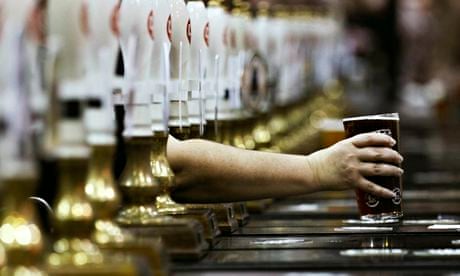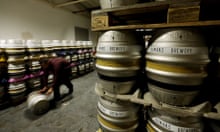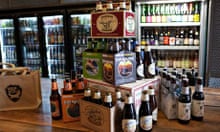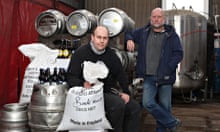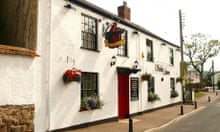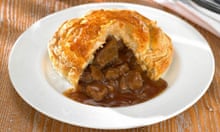This week, Melissa Earlam of the Swiss banking firm UBS suggested that the global brewing giants AB InBev and SABMiller might at some point merge to create SAB-InBev.
Both companies are already the strangely rootless products of previous mergers. Anheuser-Busch InBev is Belgian-Brazilian and controls brands such as Budweiser, Stella Artois and Corona, while SABMiller is based in London but owns Pilsner Urquell, Peroni, Foster's and other international lager brands.
It seems inevitable to us – the end point of a process that has been under way since the 18th century, when brewing moved out of the kitchens of inns and private houses and into sprawling, custom-built industrial facilities that at the time seemed like wonders of the world.
In Britain, the process really picked up the pace after the second world war, when many towns lost their own breweries to takeovers by "the big six", which included Whitbread and Watneys. By the 1970s, nationally marketed brands such as Red Barrel had become ubiquitous.
But it didn't stop there. Carlsberg opened its first brewing plant in the UK in partnership with Watneys in Northampton in 1974. Gleaming and computer-controlled, it was opened by Princess Benedikte of Denmark, ushering in the age of the international beer brand.
Marketing one brand worldwide is irresistibly efficient, and shareholders like efficiency. Truth be told, consumers don't mind it either, as long as it means they can get a beer they trust wherever they are in the world at a competitive price, or, as in Britain, a whole slab of them at the supermarket for the price of two rounds in the pub.
Efficiency does not, however, always lead to tasty beer. Brewers are often tempted to make even "premium" brands weaker, sweeter and blander in an attempt to appeal to as many palates as possible while also cutting the cost of production, and their tax bill.
Would a vast SABMiller astride the world threaten nascent small-scale, craft beer industries? Probably not, because what is emerging is a polarised brewing scene. On the one hand, colossal companies producing cheap beer and, on the other, craft brewers turning out (relatively) small amounts of beer with more limited appeal, and usually a higher price tag.
Craft beer (a slippery term we won't attempt to define here, but you know what we mean) is a small part of the overall market, but dominates the conversation around beer. In Britain, as the result of a consumer fight-back in which the Campaign for Real Ale played a vital role, there are now more than 1,150 breweries – a return to pre-first world war numbers. Almost all of them produce beers that have discernible flavour. Now, you might not like those flavours, but at least they're there.
It's the difference between a brick of mild cheddar and one of those rind-washed cheeses that smells like a mortuary in summer. We are trying hard not to convey a sense of judgment here: people have different tastes, not to mention pockets of varying depths.
Because no one is making investments based on our predictions, we can be bolder than Earlam: in 20 years, without government intervention, we're sure there will be a single large brewing company with its head office aboard a heli-carrier somewhere over the Atlantic, producing one sickly sweet beer-style fruit-flavoured leisure beverage product of about 2% alcohol, sold in every supermarket and hotel bar in the world.
But we're also certain that, at the same time, every town in Britain will once again have its own local brewery, and that the weirdest evolutionary dead ends of brewing, from "meat stout" to Devon white ale, will be back in regular production in a railway arch or barn somewhere.
